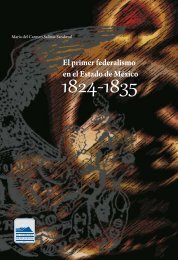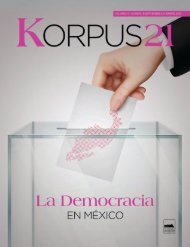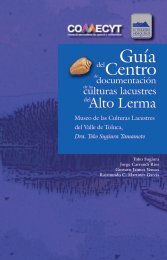Create successful ePaper yourself
Turn your PDF publications into a flip-book with our unique Google optimized e-Paper software.
ERIC VAN YOUNG, THE SPHYNX OF SAN COSME: A HISTORIAN’S THOUGHTS ON WRITING A BIOGRAPHY<br />
did not) I would distance myself from making<br />
assertions, limiting myself to suggestive observations<br />
and questions. When in his unpublished<br />
memorias of 1833 and some correspondence,<br />
for example, Alamán mentions his mother’s<br />
unusual attractiveness and her other qualities<br />
while scarcely mentioning his father at all, and<br />
certainly with little emotional charge, an extravagant<br />
psychobiographical interpretation might<br />
have drawn conclusions about Oedipal tensions<br />
within the nuclear family and attempted to extend<br />
these into aspects of his adult life. Here the<br />
lever would have snapped from the weight of<br />
over-interpretation. So what I did was to stick<br />
close to the surface of the text, noting Alamán’s<br />
obvious admiration and affection for his mother<br />
and a certain coolness —or if not coolness,<br />
blandness— toward his father, and leaving the<br />
conclusions to the reader.<br />
In the end I believe that a skeptical, reasonable<br />
methodological eclecticism is the best approach<br />
to the writing of biography, characteristics<br />
that the best biographies, of which there are<br />
many examples, seem to display. Not adhering<br />
to a strict psychoanalytic agenda (or any other<br />
framework, for that matter) in biographical writing<br />
may cost a work some methodological edge,<br />
but gains for it flexibility and accessibility. The<br />
Pulitzer Prize-winning biography of J. Robert<br />
Oppenheimer by Kai Bird and Martin J. Sherwin<br />
does not shy away from the subject’s complicated<br />
psychology but handles it in common-sense<br />
terms comprehensible to any educated layman.<br />
The same is true of Edmund Morris’s three-volume<br />
biography of Theodore Roosevelt (Bird<br />
and Sherwin, 2005; Morris, 20<strong>10</strong>).<br />
Neither of these works is psychobiography as<br />
such but still allow ample room for the psychological<br />
dimension of their subjects.<br />
As with the question of how much detail in a<br />
biography is too much (discussed below), there<br />
arises here the question of how much psychologizing<br />
is too much. Unless it is handled judiciously,<br />
the “psycho” in psychobiography can<br />
land with a thud and turn out to be just as reductionist<br />
as an injudicious Marxian approach.<br />
This is a tendency of some of the writing on Oscar<br />
Wilde, for example, even of a masterful work<br />
such as Richard Ellman’s. Studies of the Irish<br />
writer may over-emphasize Wilde’s closeted<br />
homosexuality, since the scandal of his relation-<br />
ship with the young English nobleman Lord Alfred<br />
Douglas, his trial, and his downfall was the<br />
cause célèbre of the late Victorian age. What is<br />
just as interesting about Wilde, of course, is that<br />
as an Irishman he was to a great degree an outsider<br />
looking in from the periphery, making his<br />
way in English society, successful at beating the<br />
English at their own literary and social games—<br />
up to a point. There are monumental biographical<br />
works that almost completely eschew efforts<br />
at plumbing the interior lives of their subjects,<br />
concentrating on their thinking, activities, and<br />
the historical context in which they lived and<br />
worked. Such a study is the biography of John<br />
Maynard Keynes by Robert Skidelsky, largely devoted<br />
to Keynes’s economic ideas and the times<br />
in which these developed—a complex portrait of<br />
a major historical and intellectual figure without<br />
much in the way of psychological discussion at<br />
all (Skidelsky, 2005). 20<br />
Sources<br />
A casual encounter with a written source of<br />
some kind may even precede the choice of a<br />
subject for a biography; this was certainly the<br />
case with my research on Lucas Alamán since I<br />
read parts of his magisterial Historia de Méjico<br />
while working on the history of the Mexican independence<br />
movement and knew something of<br />
him from general reading on the early republican<br />
period in Mexico. As I have already noted,<br />
given my ambition to write a biography by way<br />
of penetrating the interior life of a subject rather<br />
than simply narrating and analyzing an event or<br />
historical epoch, it is ironic that I chose Lucas<br />
Alamán since as a personality he was reserved<br />
to the point of opacity. There are generic types<br />
of sources that many biographers use; a catalog<br />
of these would not serve my purposes here,<br />
but I will briefly mention a few. In the case of a<br />
person as intensely involved in national politics<br />
as Alamán, in both ministerial and other positions,<br />
there are bound to be government documents<br />
that illuminate his career: official correspondence;<br />
reports he either wrote himself or<br />
edited; government newspapers; documents<br />
related to his appointments, to his relations with<br />
the national congress, and the administration<br />
20 A one-volume reduction of the original three-volume<br />
work.<br />
<strong>10</strong>


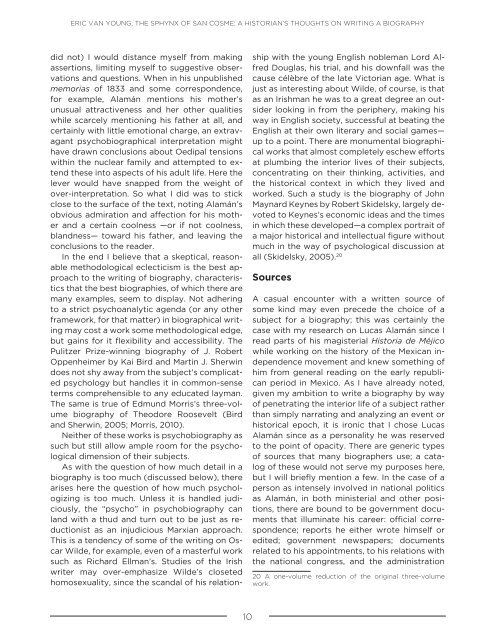
![bicentenario_1[V2]](https://img.yumpu.com/68677971/1/167x260/bicentenario-1v2.jpg?quality=85)
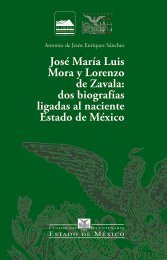
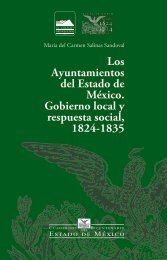
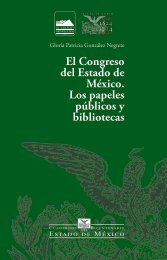
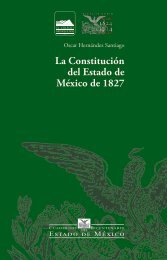
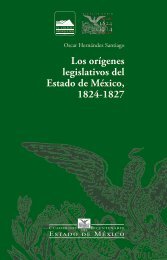
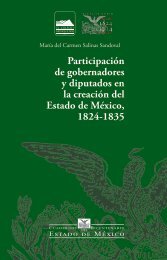
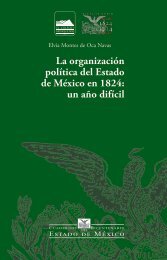
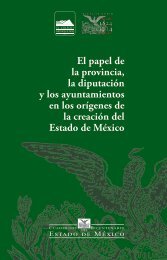
![El_primer_federalismoEM[final]_compressed (2)](https://img.yumpu.com/68483279/1/178x260/el-primer-federalismoemfinal-compressed-2.jpg?quality=85)
